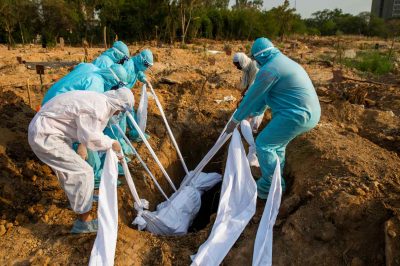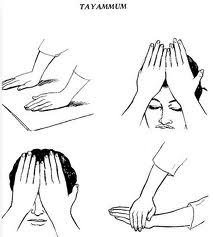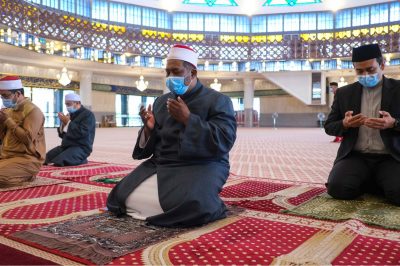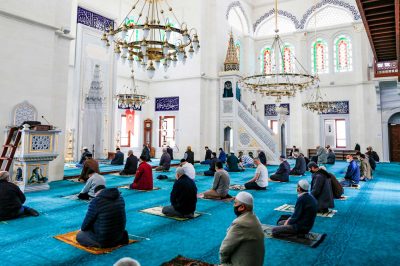Answer
In the Name of Allah, Most Gracious, Most Merciful.
All praise and thanks are due to Allah, and peace and blessings be upon His Messenger.
In this fatwa:
1- If, during COVID-19 quarantine, doing ghusl with cold water or hot water will make your sickness worse or delay your recovery, it is permissible for you to turn to the option of tayammum.
2- You can bring some earth from outside the hospital in a bag and the like, or you can do tayammum by putting your hands on the wall or the carpet, if there is any dust on it.
3- The same applies to doing wudu. If using water for wudu will harm you, you may turn to the option of tayammum.
4- You have to offer the prayer with all its essential parts, namely standing, bowing, prostrating and sitting, even if you are in a shared room and even if there are men in the room. It is not valid to pray omitting any of the essential parts of the prayer with no excuse.
In responding to your question, the Fatwa Center at Islam Q & A, states:
Purification during COVID-19 quarantine
We ask Allah to heal you and grant you well-being.
If doing ghusl with cold water or hot water will make your sickness worse or delay your recovery, it is permissible for you to turn to the option of tayammum. You can bring some earth from outside the hospital in a bag and the like, or you can do tayammum by putting your hands on the wall or the carpet, if there is any dust on it.
The same applies to doing wudu; if using water for it will harm you, you may turn to the option of tayammum.
Sheikh Ibn Baz (may Allah have mercy on him) said:
“Because Islamic teachings are based on making things easy, Allah, may He be glorified and exalted, has made it easier for those who have excuses to do their acts of worship, according to the situation, so that they can worship Him, may He be exalted, without hardship or difficulty.
Allah says:
{[Allah] has not placed upon you in the religion any difficulty.} (Al-Hajj 22:78)
{Allah intends for you ease and does not intend for you hardship.} (Al-Baqarah 2:185)
{So fear Allah as much as you are able.} (At-Taghabun 64:16)
And the Prophet (PBUH) said: “If I instruct you to do something, then do as much of it as you can.” (Muslim)
And he said: “Religion is easy.” (Al-Bukhari)
If a sick person is not able to purify himself with water, by doing wudu in the event of minor impurity or doing ghusl in the event of major impurity, because he is unable to do that or if he is afraid that it will exacerbate his sickness or delay his recovery, then he should do tayammum.
How to Offer Tayammum
One can do tayammum by striking the hands once on clean earth, then wiping his face with his palms and wiping the hands up to the wrists. Allah says:
{And if you are ill or on a journey or one of you comes from the place of relieving himself or you have contacted women and find no water, then seek clean earth and wipe over your faces and your hands [with it].} (An-Nisa 4:43)
If someone is unable to use water, he comes under the same ruling as one who cannot find any water. Allah says:
“So fear Allah as much as you are able.” (At-Taghabun 64:16)
And the Prophet said: “If I instruct you to do something, then do as much of it as you can.” (Muslim) (Al-Fatawa al-Muta`alliqah bil-Tibb wa Ahkam al-Marda, p. 26)
Sheikh Ibn Uthaymeen (may Allah have mercy on him) was asked: If a sick person cannot find earth, can he do tayammum (by striking his hands) on the wall or the bed – or not?
He replied:
“The wall is regarded as being of clean earth. If the wall is built of earth, whether it is stones or mud – bricks of clay – then it is permissible to do tayammum (by striking his hands) on it.”
But if the wall is covered with wood or paint, if there is dust on it, then he may do tayammum (by striking his hands) on it, and there is nothing wrong with that; he will be like one who does tayammum (by striking his hands) on the ground, because dust is of the same substance as the earth.
But if there is no dust on it, then it does not come under the heading of earth, so he cannot do tayammum (by striking his hands) on it.
With regard to the bed, we say: if there is dust on it, he may do tayammum (by striking his hands) on it, otherwise he cannot do tayammum (by striking his hands) on it, because it does not come under the heading of earth.” (Fatawa at-Taharah, p. 240)
Offering Prayer during COVID-19 quarantine
You have to offer the prayer with all its essential parts, namely standing, bowing, prostrating and sitting, even if you are in a shared room and even if there are men in the room. It is not valid to pray omitting any of the essential parts of the prayer with no excuse.
The fact that men are present or can see the woman is not an excuse for not doing all the essential parts of the prayer. The woman can wear loose and concealing garments, as they do when they go out to a place in which there are non-mahram men and pray there.
Offering prayer in the presence of non-mahram men
The scholars of the Permanent Committee for Ifta’ were asked: How should a woman pray if there are non-mahram men with her, such as in al-Masjid al-Haraam? Similarly, when travelling, if there is no mosque en route with a prayer space for women?
They replied: The woman must cover her entire body when praying, except the face and hands.
But if she prays when there are non-mahram men nearby who can see her, then she must cover all of her body, including the face and hands. (Fatawa al-Lajnah ad-Da’imah (7/339).
We ask Allah to accept it from you, and to heal you and grant you well-being.
Almighty Allah knows best.
Source: www.islamqa.info




